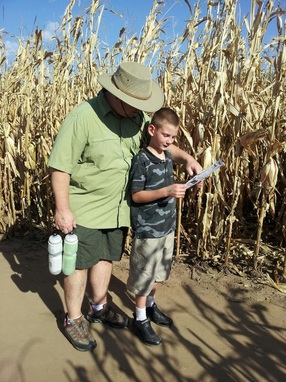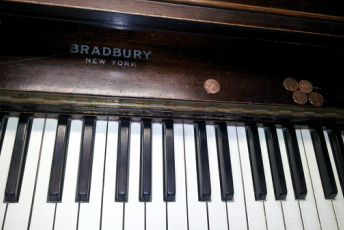|
It was actually quite traumatic. I opened the door, and realized I couldn't open the door all the way. What lay before me was worthy of a photo, and I sent it along with a text to my wife. There was no floor to be seen, as it was COMPLETELY covered with my son's clothes, shoes, towels, books, etc. I took note that there was hardly anything put on shelves. Undoubtedly, this boy is in need of an organizational strategy!
A couple of hours later, I found myself once again working with a piano student in my Wichita studio. My student was having difficulty, and I asked that age old question, "How much did you practice this week?" Surprisingly, the student stated that they had indeed practiced the prescribed amount of time during the previous week. I say "surprisingly" because the typical piano or bass student I teach would tell me that he/she "was too busy", "didn't have time", "was sick", etc. For those folks, I try to offer (without lecturing too much) the simple suggestion that they need to organize their life in such a way that practice is part of their normal daily routine. Perhaps one of my favorite ways of conveying this has been likening it to skipping their teeth brushing routine.... "now certainly you wouldn't skip brushing your teeth!" Now that I have kids, I may need to revamp that approach..... I'm pretty sure my children wouldn't mind skipping the daily dental care. Whatever my next analogy is to be, it needs to convey one simple thought: If you skip practicing your piano or bass, you should feel as if something is missing in your life. Much like that belt that my son couldn't find in his quagmire this morning. Returning to the student currently on the bench, you remember, the one who has been practicing daily? With a little questioning about those practice sessions, I ascertained that he "played the piece through" several times each day. Did you know that you can practice a mistake, convince yourself that it is correct, and become really skilled in playing said mistake? It happens all the time. An organized practice session will typically start with scale work, or a technical study like Hanon for pianists, or Simandl for bassists. Long tones are invaluable for the bassists at the beginning of their practice sessions.These are great for getting in the zone, warming up the fingers and feeling an immediate sense of accomplishment. Then we move on to our pieces. We do not play them x number of times and say we've practiced and walk away. Nor do we fixate on a clock and wait for x number of minutes to lapse. Try playing first with "big ears", listening for that thing that doesn't sound correct. Lots of times, where there's smoke, there's fire. Really examine that spot carefully and make absolutely sure you are correct with notes, rhythm, fingering (for starters). By all means, do not plow through that section and convince yourself that "it just sounds weird". Once you figure out the error, apply corrective action, and play the passage at least 5 times in a row correctly. I like to say that this proves you are not "lucky", it takes definite skill to play it 5 times in a row correctly. Plug the corrected spot back into the piece and then proceed to find other rough spots to work out. End your practice session with some improvisation, or just messing around.....have fun! Play an old favorite finished piece. For kicks, see if you can make it better..... no piece is really ever "finished". Finding practice time is now and always has been a major stumbling block in music study. When we find the time, it is important to use that time efficiently. Organizing those sessions will make practice time more efficient. David James teaches piano and bass lessons at his studio in Wichita, KS .... aptly named the David James Piano and Bass Studio. "Like" his studio page on Facebook, follow him on Twitter, check out his website at www.djpianobass.com.
0 Comments
 Special thanks to the good folks at Kansas Maize @ Gaeddert Farms. Check out their website at www.kansasmaze.com. Last Sunday afternoon, my wife and I took our two boys out to a corn maze near Buhler, KS. My 14 year old immediately disappeared and we didn't see him again until we were out of the corn maze. My wife and I decided to let our 8 yr old lead us through the labyrinth, using a map and knowledge of the basic landmarks: a hedgerow, and the road. We were witnesses to his initial enthusiasm, followed by his frustration and a desire to quit and just "let Dad lead us out", followed again by his enlightenment and a sense of accomplishment as he started applying a method for navigating the maze. With help, he led us out, and it was extremely rewarding to see our recently adopted son succeed.  I couldn't help but think of the corollary between the corn maze and what I repeatedly observe as I go about teaching piano and bass in my studio. I see it in all ages, especially with beginners. They are so excited to start taking piano or bass lessons, and the drive exists. Then comes the stage where the beginner realizes that learning to play the piano or bass requires work, study, and practice. Inevitably, some become frustrated and quit. However, if we can push on to that point where music study begins to make sense, and we can find a methodical approach that keeps bringing success, a sense of accomplishment will eventually emerge. It's what I like to call "stick-to-it-iveness". Very simply, don't quit, stay at it. You will reap a dividend in the end. Do you think today's children give up too easily? If so, what do you think may be the cause of this? Comment below! Thanks to the folks at Kansas Maze @ Gaeddert Farms for the use of their photo. Go have fun in the corn maze! Check out their website at www.kansasmaze.com David James teaches piano and bass lessons at his studio in Wichita, KS .... aptly named the David James Piano and Bass Studio. "Like" his studio page on Facebook, follow him on Twitter, check out his website at www.djpianobass.com.
When piano lessons start to "click".....!  Excellent! That's one, lets try for three! I just finished an inspirational lesson with a young piano student. A little background...she started back at the beginning of summer, she's maintained fairly good attendance, however, she's one of those students who has never really given a clear indication that she was enjoying piano lessons...not a lot of smiles, few words, and certainly not stellar performance. Improvement has been slow to come, so much so that I began thinking that this is one of those students who won't make it pass the beginning stage, maybe not even graduate from the first book. Today, she came in and played an "older piece" quite well, and I was thinking "good, she practiced". Then as we moved on to the new assignment she was supposed to work on, the confused look came back,and she confessed that she had "not practiced much". What to do? I opted to put a good spin on it and use the next 25 minutes "re-reading" the piece and talking about practice techniques that could help her out. As we stumbled into our first rough passage, I arranged some pennies on the piano fall board behind the keys. After we played it once correctly, I moved a penny from the pile and started a new pile. She played it again correctly, I move another penny to the new pile. Wow! She really seemed to like this.....smiles, and determination were suddenly in full force. That simple goal of getting 3 pennies to a new location was all she needed to dig in, concentrate, and pay attention to detail. The third time, she made an error. So I took all of the pennies back to the original pile, telling her to start again and play the passage 3 times in a row without error. This time, I had her move the pennies as she finished each successful repetition. I like this, because she had to take her hand out of position on the piano keys to move the pennies, and then to start the next rep, she had to find that hand position again. The pianists reading this know how difficult, yet valuable, finding the proper hand position is. Over the remaining time in the lesson, we read through three new pieces using this same method, more work than we've ever accomplished. The biggest accomplishment? She left with a smile on her face. After she left, I thought about it as I enjoyed "basking in the moment"....this is why I teach....I really enjoy watching someone improve because I imparted some knowledge to them. But that smile...knowing that someone is beginning to enjoy music making....it's what makes my day. David James teaches piano and bass lessons at his studio in Wichita, KS .... aptly named the David James Piano and Bass Studio. "Like" his studio page on Facebook, follow him on Twitter, check out his website at www.djpianobass.com. |
About the AuthorDavid James teaches piano and bass lessons at his studio...aptly named David James Piano and Bass Studio in Wichita, KS. Archives
March 2014
Categories
All
|


 RSS Feed
RSS Feed

